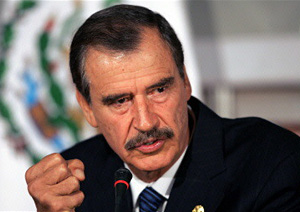 |
 |
 |
 Editorials | August 2006 Editorials | August 2006  
The Final Days of Mexican President Vicente Fox
 Enrique Andrade González - MexiData.com Enrique Andrade González - MexiData.com


| | Fox did better than his predecessors with their doctorates in economics from Harvard and Yale. |
Independent to the outcome of Mexico’s post-election conflict and the decision on who will be Mexico’s next president, which will be decided by the Federal Electoral Tribunal or Congress, the final day in office for President Vicente Fox will be November 30, 2006. Vicente Fox, the rancher and businessman who in 2000, at age 58, defeated the party that had monolithically governed Mexico for more than 70 years.

To win the presidency Fox promised a great deal, and as a consequence the down side of his six years in office is not having kept important campaign promises: peace in Chiapas within 15 minutes; seven percent annual economic growth; or the creation of more than 1 million jobs per year. Nor was he able to bring about his proposed fiscal, energy and labor reforms; he was unable to build a new international airport for Mexico City; he could not control migration; and worst of all, he leaves a country divided.

On the up side, today the Mexican economy is sound; the annual rate of inflation was kept below ten percent; the Mexican peso’s devaluation to the US dollar was minimal; the foreign debt was reduced; and central bank reserves are substantial. In these respects (up to now at least) Fox did better than his predecessors with their doctorates in economics from Harvard and Yale.

Domestically, Fox essentially governed with and for his main allies, business and the media. Forgotten were the relationships with those in rural Mexico and with workers. He struggled unsuccessfully against the unions, like the petroleum workers’ and miners’ unions, and even with foreign investment coming in he was unable to create new jobs or markets in areas like casino gaming, investment for the development of the petroleum industry, or new technology food production.

He ran an entrepreneurial government that increased social differences.

Yet too it must be acknowledged that the Fox administration has increased respect for the freedom of expression, as well as access to public information, although much remains to be done in these areas.

Regarding foreign policy there is a negative balance. Fox has not reached an agreement on migration with the United States, nor on a review of the North American Free Trade Agreement (NAFTA). Due to his policies, Mexico abandoned its Latin America leadership position, he has had confrontations with the Cuban and Venezuelan governments, and he was not able to set in motion new foreign policy definitions as demanded from the moment Mexico took its two year nonpermanent member seat on the United Nations Security Council in January 2002.

As with many earlier presidents, like Gustavo Díaz Ordaz or Carlos Salinas de Gortari, history will judge Fox, and it will be more on his final year in office then the first five. This considering the burden that the post-election conflict will represent, along with perhaps a beginning of social decomposition caused by a fact that cannot be denied. Due to actions or neglect, Fox helped to keep Andrés Manuel López Obrador from winning the presidential race. Where the doubt lies is if he did so according to law or not, and this is what history – penned by the victors – will record of his sexennial.

Fox, even though July 2 victories may be confirmed for the National Action Party in Congress, in three state gubernatorial elections (Guanajuato, Jalisco and Morelos), and for the Mexican presidency, has not become a victorious president – in spite of having an approval rating of over 60 percent. Fox cannot say unabashed that the people of Mexico approved his six years in office in the elections, and ratified confidence in his party for six more years.

He cannot do so regardless of the results, because someone just like him – who grew politically by criticizing the president during his term in office, waving flags of the poor and inequality, and ill-prepared to govern, has sown doubt regarding the legitimacy of the past election. López Obrador will not let Fox celebrate.

In the less than 100 days left in his presidency, Fox will have to personally decide how to conclude the duty of succession. If he will have to use force, or will he be able to come to needed agreements? These decisions have now become the most important of his time in office, and during these remaining days Fox will have to bring into play everything learned during almost six years in power.

Few believe he will be up to the task.

Enrique Andrade, a Mexico City-based attorney and business consultant, writes a weekly column for MexiData.info. He can be reached via e-mail at enriqueag@andradep.com. | 
 | |
 |



